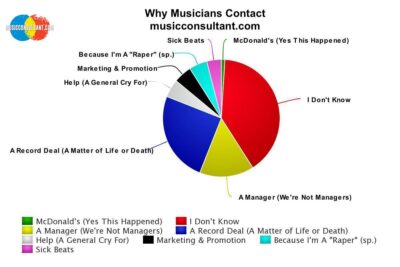Cold Email F&*k-ups
An older article about biggest bio f&*k-ups got me thinking about another important part of marketing music that is frequently majorly messed up by musicians: writing cold emails. If you are serious about pursuing a career in music, you will undoubtedly have to write a lot of cold emails in order to get your music out into the world and build a strong support network of fans and professionals – journalists, booking agents, venue owners, managers, music publishers, lawyers, label executives, etc. – that will collectively help you find success (and true happiness) doing what you love. So, how much confidence do you have in your cold emailing skills?
Let me answer that question for you by making a statement: You are f&*king awful at writing cold emails.

Most people on the planet now compose innumerable emails, texts and instant messages each day. And the line between all these vastly different pieces of writing is getting pretty blurry as humanity collectively loosens its grip on clear, engaging language. I feel very strongly that because communicating with someone in writing is no longer a thoughtful process involving paper, a pen (or, if you are feeling fancy, a typewriter), stamps and an envelope, basic writing skills and conscientiousness have been compromised. In fact, based on some of the emails I personally get (and the ones that both Rick, Marty and I get through the Music Consultant site), I suspect that a lot of people are not even conscious (or at least are not sober) when they haphazardly put some words together and hit “send.”
Contrary to what many artists seem to believe, an email you send to those who you are trying to make fans of you and your music – whether you are trying to compel them to buy a song or an album, or partner with you on some aspect of your career – is not a text message to the cute chick you just met at a bar (though hopefully you can get her to love your music too). Whether you are writing bad emails because you legitimately have literacy issues (in which case, you likely would not be reading this right now), or because the sweet, lazy world technology has created just has you in its grips, you need to do a lot better if you want to carve out a solid space for yourself in the music business.
Are you hearing crickets after sending cold emails? Below are some of the mistakes you might be making.
1. “I have no idea what I want. Maybe you can figure it out for me!”
I have received an embarrassing number of emails from strangers saying nothing more than, “Help me.” Help you build a house? Help you find your lost dog? Help you because you have injured yourself and are completely incapacitated except for the use of your index finger? (And if this is the case, use that index finger to dial 9-11 … and make sure to describe what happened to you when someone answers.) Sometimes these emails vaguely identify the type of help required, i.e., “marketing help,” “bio help.” Others offer up a link to a half-assedly-created website. Regardless, if you send me this statement, I still cannot identify with certainty why you are emailing. And even if I have a vague idea, I certainly don’t have the time to play 20 Questions in order to diagnose you, identify the problem(s) you are having and see if I have solutions.

I would venture to guess that no one – regardless of their position in the music industry – wants to “help!” you if you have no clue what your own problem is, or if you don’t feel like writing one or two sentences to explain it. Let me clarify: It is totally fine to not understand elements of the incredibly complicated music industry and to reach out for some support or to ask questions. But you have to know what your goals are as an artist, then clearly identify where you are struggling and know why these challenges are preventing you from succeeding. And then you have to be able to communicate this to someone else.
Additionally, before you even think about reaching out to someone, make sure the services that person provides are actually at least close to what you are seeking by doing some research. For example, you wouldn’t email a plumber if you needed an emergency appendectomy. Don’t email a label executive if you need management.
2. “Are you awesome enough to deal with how awesome I am?”
Being confident and excited about your music is definitely a good thing and will significantly help you market yourself. And inserting a spirit of genuine excitement into the cold emails you send can certainly compel a journalist, executive or a potential fan who does not know you yet to click on links, listen to your songs and even come to your shows. But there is a fine line between confidence and cockiness … and between excitement and aggressiveness. And no one wants to get involved with a cocky, aggressive musician.
Even if you are the most talented performer since Michael Jackson, you shouldn’t say it – not even if you have a glowing testimonial from your grandmother. (And, yes, I have seen more than one email in my lifetime saying, “My mom and everyone else says I have real talent and will go real far.”) If you are prone to waxing braggy about your accomplishments, take a step back and tone it down. Personally and warmly address who you are emailing, explain why you are getting in touch, describe the style and sound of your music in simple terms (using comparisons to other artists, if possible), offer up a link and let your work speak for itself. Don’t be cute, and don’t get smart.
Here’s an excerpt from an actual email that came through the Music Consultant site recently to provide an example of the above. This was a very-first email and not a response to anything. I would call the tone “combative.”
“Hey, too much talking. Be shorter in your presentation next time. With
or without you we’ll get going.
How about collaborating?
Just place your offer.
In the meanwhile, enjoy our music.”
3. “How does punctuation work again oh yeah it’s hard I won’t use it.”
I think the following real email provides an amply powerful introduction to mistake #4:
“Hi I need a manager slash producer I have been on the radio I sell one hundred CDs a day an I have a team of give an we are all doing that an we need someone to take use to the next level we doing show but just in the city an everybody love use I need someone who is going to take me to that next level hit me back an we see if I can keep up an make some money I’m willing to give I 25% off what ever we make a man told me if I think pants I get pants so I’m thinking millionaires get a me thank u”
Exercise some breath control, and please, please use some punctuation. Lack of punctuation in an email pisses me off more solidly than all caps – though, please take care not to yell at me by turning the Caps Lock OFF – and is far more exhausting to read. (Though imagine the above email in all caps, and it will make your head explode.) When I get an email without punctuation, I assume that the person is a) lazy; b) an elementary-school-aged child that has been left home alone and figured out a way to bypass the parental controls on the computer.
And if you are shaky on punctuation usage, don’t just say, “Screw it” and let it fly. Speak the email out loud and at least try to put in some sort of a punctuation in the spaces where you take a breath. Remember, the person you are emailing is a stranger and will unfortunately be less forgiving than a friend or a family member, not to mention even less able to figure out what you are trying to say.
(Also, I’ve been thinking “pants” for weeks, and no new pairs have appeared. I call foul.)
4. “I need, I need, I need …”
A huge part of marketing and promotion is obviously asking for things you need. You need to get a lot of people to buy your music and pay for tickets to your shows, so you can get paid for the work you do. And you need journalists to listen to your music and like it enough that they will write positive reviews … which will bring more people to your performances and help you sell more albums. Basically, you need other people to invest in your career with their time, money and passion in order to stay “in business” as a professional musician.
Guess what? Everyone knows you need things. And they’re all totally cool with that. And if you make great music, they’re pretty thrilled to have the opportunity to help you succeed. (I know I am.) When you’re writing a cold email, you have to state your needs right up front. And musicians have become a lot better at stating their needs, since huge shifts in the industry recently have forced them to take charge of their own destinies. But even those that know what to ask for sometimes fail at another essential element of a cold email: Offering gratitude for the recipient’s time and attention. If possible, find a way to thank the person you are emailing for taking the time to hear you out at the beginning of the email, then reiterate it at the end (along with, of course, a compelling “call to action” of some sort such as “let me know if you would be interested in [insert what you are asking them to work on with you] at your earliest convenience”). A little buttering up is welcome, as long as there is a real spirit of “thanks” behind it.
5. “Thanks for nothing.”
Mistake #5 takes on a couple different forms, but it involves following up. Many wonderful artists send me thoughtful emails asking for help with bios, press releases, social media management, general marketing … or to listen to their music for reviews or some other purpose. And while sometimes it takes me a little time to respond, I always listen to the music (when it is presented to me) and put real thought into my responses. It shocks me how often this thoughtful response is met with complete silence.
Whenever you send a cold email, you must make a plan to follow up with it … even if there is no response, or if the response is negative. If you are trying to hire a professional to help you with recording, your marketing materials or legal issues and discover his/her services are beyond your budget, thank the person for their time and politely decline. If you are not saying, “No,” rather trying to save up money to afford help, make that fact known (and you never know; the person might love your music enough to come up with a different solution that is financially feasible for you). If you get an email back from a journalist saying that your music is not a good fit for his/her publication, make sure you at least send a quick “thank you.” When you send nothing, you communicate that you are either outright rude or completely flaky.
And of course, if you get no response to your cold email, follow up in a couple weeks with a gentle reminder of who you are and that you got in touch previously. People do get busy, and cold emails often are the first to get neglected. If you don’t hear back after the second attempt at contact, move on.








